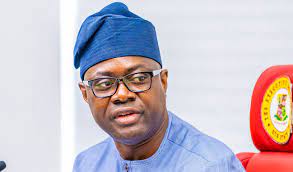Few hours after receiving the report on the activities of the embattled Zamfara state Deputy Governor Mahadi Aliyu Gusau and his consequent impeachment by the state legislature Wednesday, a serving lawmaker, Senator Hassan Mohammed Nasiha was sworn in as his replacement.
The impeached deputy governor is the son of General Mohammed Gusau (retd), a powerful military operative and influential Nigerian otherwise known as Mr Spy.
Nasiha, was until now, the lawmaker representing Zamfara Central at the National Assembly.
The report
The investigating panel submitted the report to the House of Assembly and read on the floor by Speaker of the House Rt Hon Nasiru Mu’azu Magarya.
Magarya told the plenary that the committee set up to investigate the former deputy governor found him guilty of all the charges levelled against him, and directed his colleagues to proceed with individual voting of affirmation for the deputy governor to be impeached as required by the law.
There and then, the House Clerk, Shehu Saidu Anka constituted a voting panel where each and every member was being called in alphabetical order of their constituencies to affirm his vote.
At the end of the exercise, twenty (20) out of twenty members (22) voted in favour of the impeachment while the only Peoples Democratic Party (PDP) member of the House Hon Salihu Usman Zurmi was conspicuously absent during today’s plenary.
Having secured the required number of the votes as directed by the constitution, Speaker Magarya announced the impeachment of Gusau from office.
“By virtue of section 1999, the members hereby affirmed the nomination of Sen. Hassan Mohammed Gusau as the new Deputy Governor,” the Speaker declared.
At this point, the House adjourned plenary for one hour to pass the resolution to the executive and also expected a communication for the nomination of the new deputy governor from the executive for screening and confirmation by the legislature in accordance with the law.
Subsequently, Nasiha was screened by the lawmakers and confirmed as the substantive deputy governor.
Inauguration
Inaugurating the new deputy governor, Governor Bello Mohammed Matawalle charged him to support his administration in the development of the state.
Matawalle, who assured of a cordial working relationship with the deputy governor, also urged the former lawmaker to come up with initiatives to address the lingering insecurity bedevilling the state.
“I will work closely with you to find out modalities on addressing the insecurity situation for peace to thrive,” Matawalle stated.
He said the choice of Nasiha was an outcome of series of consultations and also based on his dedication to the development of the state at the National Assembly.
Governor Matawalle commended the state lawmakers for their steadfastness and for staying by the Constitution they swore to uphold.
Matawalle further charged the deputy governor to ensure unity among people of the state and create open door policy to all, regardless of their political inclinations for the development of the state.
In his acceptance speech, Deputy Governor Nasiha promised to work harmoniously with the office of the governor for the unity and progress of the state.
Rift over defection
Gusau’s travails started following his refusal to join Governor Matawalle who, sometime last year, defected from the Peoples Democratic Party(PDP) to the All Progressives Congress (APC).
The duo assumed office on the platform of the PDP following the Supreme Court judgement which disqualified the candidates of the APC earlier declared winners in the 2019 elections.
The House had served the deputy governor the impeachment notice through the Secretary to the State Government before asking the Chief Judge to constitute an investigative panel to verify the allegations against him.
Offences
The House, through its Chairman, House Standing Committee, Shamsudeen Basko, said the deputy governor was accused of three offences.
These are “abuse of office, criminal self-enrichment using public funds and failure to discharge official duties.”
Mr Basko said: “Abuse of office. This includes Constitutional breach of sections 190 and 193 (1), (2) (a) (b)(c), of the Constitution of the Federal Republic of Nigeria 1999 (as amended).
“Criminal self-enrichment using public funds; includes criminal diversion of state funds, conspiracy to defraud the state and approval of dubious retirement in his office.
“Failure to discharge constitutional duties, which give rise to insubordination,” he added.




